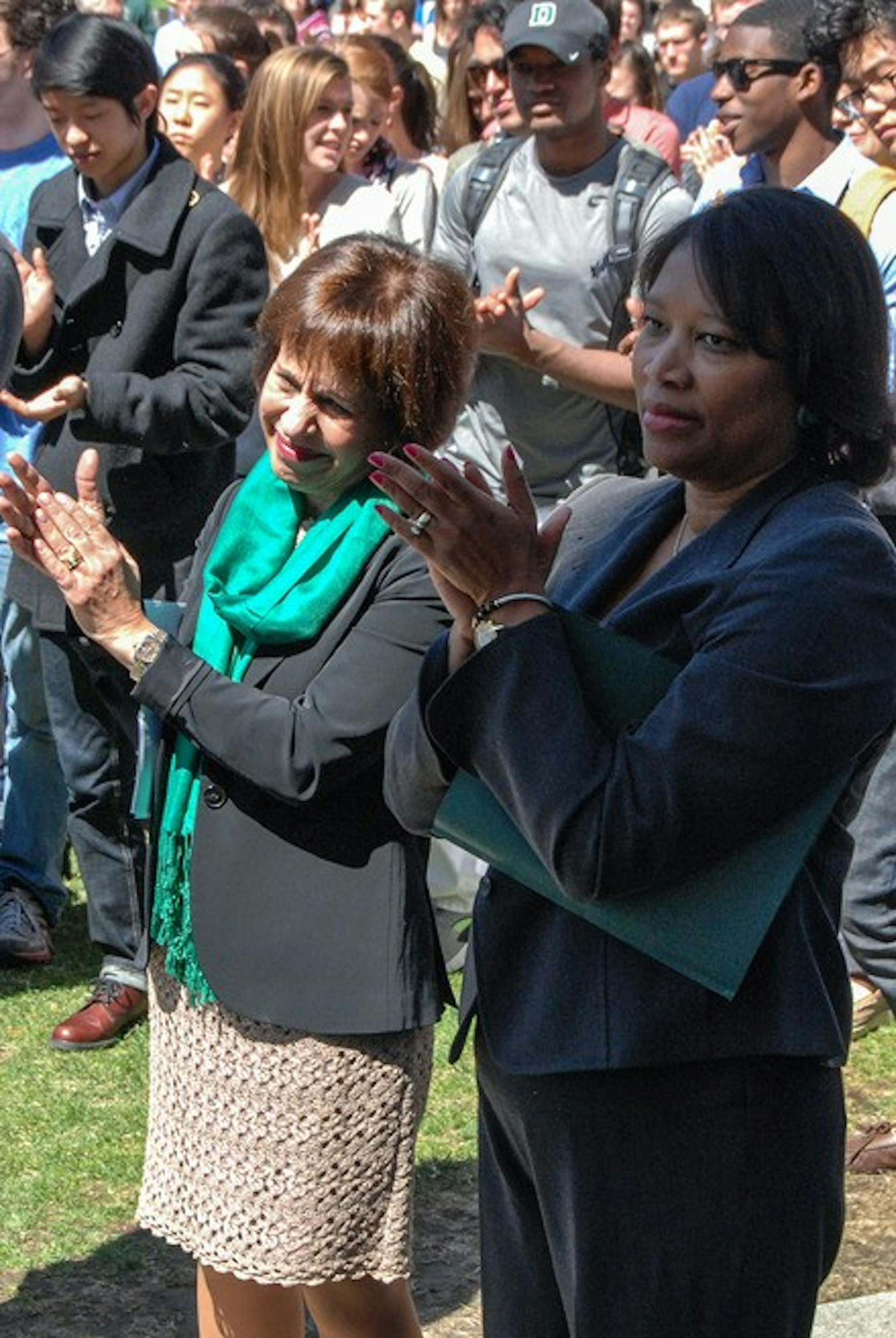Interim College President Carol Folt stressed that the decision to cancel class on Wednesday was not a direct response to the protesters, but based on a consensus among faculty that threats against students brought the College to a "tipping point" that demanded greater action.
Both Folt and Dean of the College Charlotte Johnson agreed in a joint interview that levels of racism, sexism and homophobia are not any greater at Dartmouth than at other campuses. Johnson said she did not believe that the Greek system could be blamed for the issues that protesters demonstrated against.
"We should be very careful before we start targeting any one segment of the population as exclusively responsible for the problems," Johnson said. "I don't think it would be any fairer to target students who participate in the Greek system than to target the protesters and say that any one group is responsible."
The College hopes to take appropriate action toward those who post derogatory comments and threats on Bored at Baker, but is challenged by the site's independence.
"What we do for those that violate our standards of conduct is try to find out who posted the anonymous comments, which is very difficult due to the way that Bored at Baker is constructed," Johnson said.
Johnson said the College has not successfully obtained information from the site.
Faculty and staff interviewed were worried for students subject to anonymous comments.
"I have had individuals who come to me very distraught about the damaging and libelous things written on Bored at Baker," Dartmouth Hillel executive director Rabbi Edward Boraz said. "It's one thing to speak in generalities, and another to target people specifically."
Religion department chair Randall Balmer said the recent events echo society's cultural and religious shifts.
"What's happening here is a microcosm of what's happening to larger society because our culture has not yet adjusted to living in a multi-faceted community, so we need to come up with a new moral vocabulary," Balmer said. "This will be a major challenge for the 21st century, and is important for us to be able to have these types of conversations."
During the meeting yesterday morning, faculty discussed the decision to cancel classes and issues surrounding the current campus climate, English professor Ivy Schweitzer said.
"I thought that it was important because canceling classes is a big deal, and it was important for the administration to show real unequivocal support for the students who have been the objects of harassment and hate speech," she said.
Balmer said he supported the decision given the severity of the issues.
"I think it's a pretty dramatic step to cancel class, but appropriate if it calls more attention to the issues," Balmer said. "I was extremely distressed by the comments I had read online."
Other professors were more critical of the administration's response. saying that canceling classes was unnecessary.
"They could have still had the same programming if they did not cancel classes and made the start time 3 p.m.," computer science department chair Thomas Cormen said.
The faculty meeting did not seek to pass resolutions or establish concrete steps, but hoped to create a reflective atmosphere. Faculty members will meet again in May.
Folt commended faculty members for their ideas on improving relationships with students. A number of faculty members agreed that it is necessary to discuss campus culture with students in classes and office hours.
"We don't just go away in the evenings and weekends, but campus problems impact our academic experiences with students and these discussions are important for their development," Schweitzer said.
Although campus conversation is moving away from the protests and toward core issues, many students remain curious as to whether administrative action will be taken against protesters, who broke College rules outlined in the Dartmouth Student Handbook, which prohibits conduct that "prevents or disrupts the effective carrying out of a College function or approved activity, such as classes, lectures, meetings, interviews, ceremonies and public events."
Roughly 76 percent of students said the protesters should receive disciplinary action, according to a campus survey of 1,176 people conducted by The Dartmouth.
Reid Aronstein '16, who rushed the field at the Homecoming game last fall and was sentenced with two terms of College probation, said the actions of the protesters were of the same magnitude as his offenses.
"The administration said that dressing up in wacky costumes and running on the field reflected poorly on the student body and was uncharacteristic of an Ivy League school," Aronstein said. "If that reflects poorly on Dartmouth, then yelling that Dartmouth is racist, sexist and homophobic to students who are not even part of our community yet definitely reflects poorly on the school."
Justin Carrier '16, who was also punished for rushing the field, said the College treated him like a criminal during the judiciary process.
"Sitting in the back of the police car, it felt like the police officer treated us like less of criminals than the school did," Carrier said.
Johnson said the administration will not release any of the details about the protesters' judiciary proceedings.
"There is nothing different about this situation than any other situation, except that I think the community may want a public condemnation, but we refuse to do that out of respect to their privacy," Johnson said.




